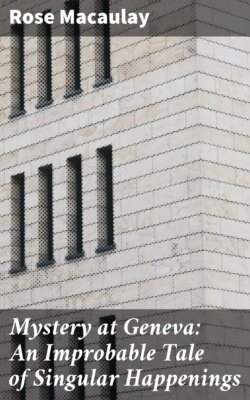Читать книгу Mystery at Geneva: An Improbable Tale of Singular Happenings - Macaulay Rose - Страница 7
На сайте Литреса книга снята с продажи.
5
ОглавлениеTable of Contents
So here, thought Henry of the British Bolshevist, was this great world federation in session. He could not help being excited, for he was naturally excitable, and it was his first (and, had he known it, his last) Assembly. He was annoyed by the noisy moving and chattering of the people behind him in the gallery, which prevented his hearing the opening speech so well as he otherwise would have done. Foreigners—how noisy they were! They were for ever passing to and fro, shaking hands with one another, exchanging vivacious comments. Young French widows, in their heavy crape, gayest, most resigned, most elegant of creatures, tripped by on their pin-like heels, sweetly smiling their patient smiles. How different from young British widows, who, from their dress, might just as well have only lost a parent or brother. All widows are wonderful: Henry knew this, for always he had heard “Dear so-and-so is being simply wonderful” said of bereaved wives, and knew that it merely and in point of fact meant bereaved; but French widows are widows indeed. However, Henry wished they would sit still.
Henry was at the end of a row of English journalists. On his right, across a little gangway, were Germans. “At close quarters,” reflected Henry, “one is not attracted by this unfortunate nation. It lacks—or is it rather that it has—a je ne sais quoi.... It is perhaps more favourably viewed from a distance: but even so not really favourably. Possibly, like many other nations, it is seen to greatest advantage at home. I must visit Germany.” For Henry was anxious to acquire a broad, wise, unbiased international mind.
The acting-President was speaking, in his charming and faultless English. He was saying what a great deal the League had done since the preceding Assembly. It did indeed seem, as he lightly touched on it, a very great deal. It had grappled with disease and drugs, economics, sanitation, prostitution, and education; it had through its Court of Justice arbitrated several times in international disputes and averted several wars; other wars it had deplored; it had wrestled with unemployment and even with disarmament ... (“not, perhaps, quite happily put,” murmured one British delegate to another). It had had great tasks entrusted to it and had performed them with success. It hoped to have, in the future, greater tasks yet; ... it had admitted to membership several new nations, to whom it had extended the heartiest fraternal welcome; ... above all it had survived in the face of all its enemies and detractors.... This present session was faced with a large and important programme. But before getting on to it there must be elections, votings, committees, a new President, and so forth.
The speaker sat down amid the applause proper to the occasion, and the interpreter rose to translate him into French.
An elderly English clergyman behind Henry tapped his shoulder with a pencil and said, “What paper do you represent? I am reporting for the Challenge. The Churches have not taken enough interest in the League. One must stir them up. I preach about nothing else, in these days. The Church of England is sadly apathetic.”
“It is a fault churches have,” said Henry. “All the same, the Pope has telegraphed a blessing.”
Those who would fain follow the French interpreter hushed them. Henry leant over, and watched Latin America conferring among itself, looking excited and full of purpose. Latin America obviously had something on its mind.
“What interests them so much?” he wondered aloud, and the journalist next him enlightened him.
“They've made up their minds to have a Latin American President again. They say they make a third of the Assembly, and it's disgraceful that they don't have one every year. They don't want Edwardes again; they want one who'll let the Spanish-Americans get on their legs every few minutes. Edwardes had lived abroad too long and was too cosmopolitan for them. They're going to put up a really suitable candidate this time, and jolly well see he gets it. He won't, of course. But there may be the hell of a row.”
“That will be very amusing,” said Henry hopefully.
They were taking the votes of the delegates for the committee on the credentials of delegates. Suppose, thought Henry, that in that hall there were one or more delegates whose credentials were impeachable; delegates, perhaps who had come here by ruse with forged authority, or by force, having stolen the credentials from the rightful owner.... It might be done: it surely could be done, by some unprincipled adventurer from a far country. Perhaps it had been done, and perhaps the committee would never be the wiser. Or perhaps there would be a public exposé.... That would be interesting. Public exposés were always interesting. Henry's drifting glance strayed to the platform, where the Secretariat staff sat, or went in and out through the folding door. There, standing by the door and watching the animated scene, was Charles Wilbraham, composed, pleased, serene, looking like a theatrical producer on the first night of a well-staged play.
Yes, public exposés were interesting....
The committee was elected and the Assembly dispersed for lunch, over which they would occupy themselves in lobbying for the Presidential election in the afternoon. Henry saw Charles Wilbraham go out in company with one of the delegates from Central Africa. No doubt but that the fellow had arranged to be seen lunching with this mainstay of the League. To lunch with the important ... that should be the daily goal of those for whom life is not a playground but a ladder. It was Charles Wilbraham's daily goal: Henry remembered that from old days.
